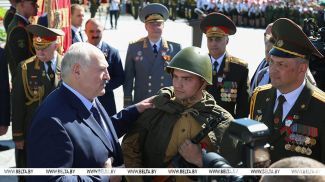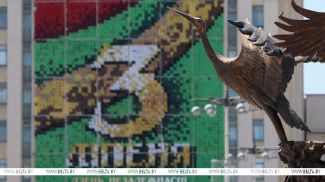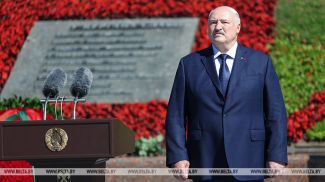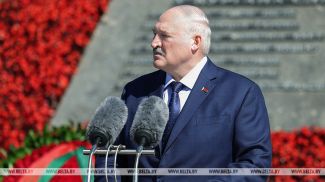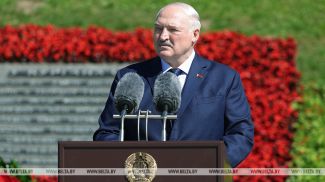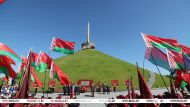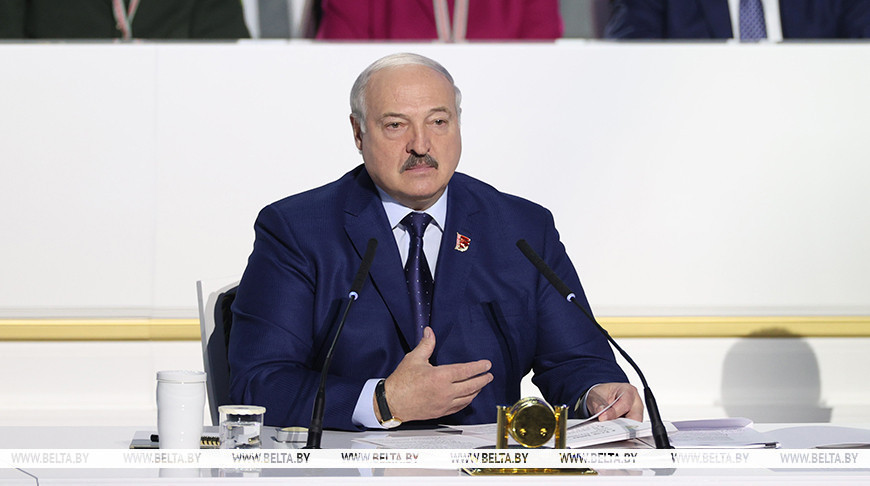
MINSK, 25 April (BelTA) – The self-exiled opposition will not be handled with kid gloves here, Belarusian President and Chairman of the 7th Belarusian People’s Congress Aleksandr Lukashenko said at the meeting of the Congress on 25 April, BelTA has learned.
The head of state described the situation on the southern border of Belarus as very tense: “A significant grouping of the Ukrainian army is concentrated in the immediate vicinity of the Belarusian border - about 120,000 people (territorial defense and the military); a set of measures has been taken in the border area to create a defense perimeter, defense areas and positions that are constantly being strengthened.”
Ukraine’s border with Belarus is lined with mines on the Ukrainian side. All types of reconnaissance is used against our country 24/7. Systematic provocative and demonstrative actions of Ukrainian military personnel against Belarusian law enforcement employees deployed in the border areas are reported. This includes violations of the state border.
“The likelihood of armed provocations by Ukrainian units that could escalate into border incidents is quite high,” said Aleksandr Lukashenko. “Those who seek to shake our regime are really looking forward to this. Amid the talks about reinstating the death penalty in Russia (that emerged after the last terrorist attack in Russia), our fugitives issued a new call. Our self-exiled opposition called for as much as the destruction of Belarus. Verbatim: Belarus remains the only country in Europe that continues to carry out the death penalty. It must be destroyed...” said the head of state.
“They are 100% ready to do whatever it takes to overthrow the government in Belarus,” the president continued. “Now they are adjusting the scenario that provides for the use of force to achieve this goal. They are updating the so-called “Peramoha 2.0” plan. Its essence is to stage “a national liberation movement” in the territory of Belarus,” Aleksandr Lukashenko said.
These so-called underground movement members are identified and their plans are discussed publicly in our country. The head of state said that Belarus is also closely watching how Americans are training a “Belarusian liberation army” on the other side of the border. The Kalinovsky Regiment and other volunteer formations, like the Russian Volunteer Corps and the Belarusian Volunteer Corps, are supposed to make the core of this army. “They hate Russia, but they banded together and are interacting,” the president noted.
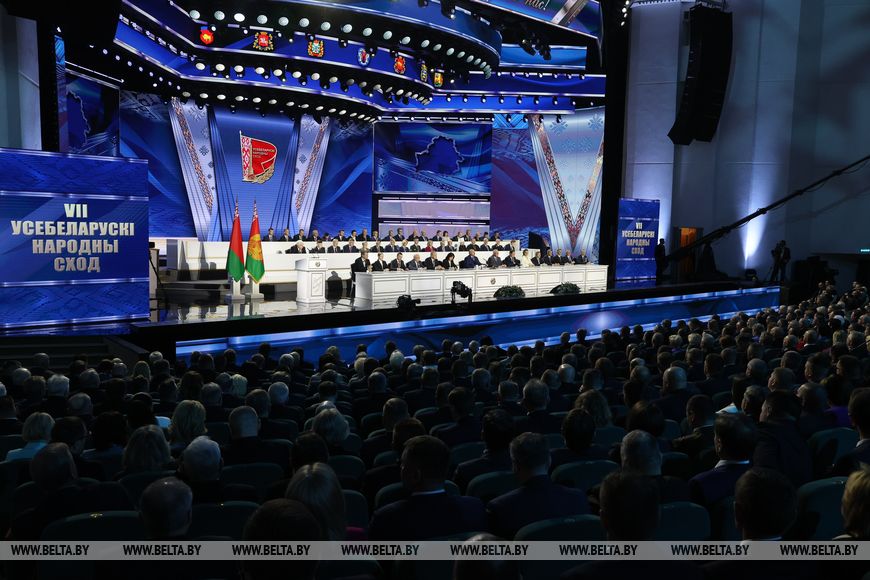
As an example of such interaction, he cited a recent raid in Belgorod: “It was spearheaded by the Russian Volunteer Corps and the Belarusian Volunteer Corps. An artillery and missile strike on these forces (according to some sources, there were about 3,000 of them), hit both the Belarusian Volunteer Corps and Russian Volunteer Corps. A lot of people were killed.”
The recruitment of radical Belarusian citizens into these units continues. They are trained in Poland, the Baltic states, and other European countries.
“We know their exact dislocation down to the millimeter. And their number,” noted Aleksandr Lukashenko. According to him, these recruited fighters hone their skills by taking part in hostilities on the territory of Ukraine. “They wouldn’t want to fight, of course. They would like to get trained in camps, but Ukrainians are not fools either: “If you want to get experience, go to the front, if you don’t go to the front, we won’t sustain you.” So they fight,” the president said.
Speaking about activities of the Belarusian self-exiled opposition, the head of state mentioned their “elections” to the “Coordination Council,” a kind of parliament in exile: “It got down even to Kalinovsky Regiment members.” There has already been a split there. They don’t see eye to eye with each other, especially in matters of politics. They don’t know who to nominate. They nominate someone only to remove this person next morning, expel from the so-called regiment, and choose a new one.”
“There are feuds and fights there. And these same people want to run a “national liberation movement” here,” noted Aleksandr Lukashenko.
“These people training in Ukraine, of course, are not driven by ideology. They are mercenaries and traitors. Mobsters. They will not be handled with kid gloves here,” Aleksandr Lukashenko emphasized.
The head of state described the situation on the southern border of Belarus as very tense: “A significant grouping of the Ukrainian army is concentrated in the immediate vicinity of the Belarusian border - about 120,000 people (territorial defense and the military); a set of measures has been taken in the border area to create a defense perimeter, defense areas and positions that are constantly being strengthened.”
Ukraine’s border with Belarus is lined with mines on the Ukrainian side. All types of reconnaissance is used against our country 24/7. Systematic provocative and demonstrative actions of Ukrainian military personnel against Belarusian law enforcement employees deployed in the border areas are reported. This includes violations of the state border.
“The likelihood of armed provocations by Ukrainian units that could escalate into border incidents is quite high,” said Aleksandr Lukashenko. “Those who seek to shake our regime are really looking forward to this. Amid the talks about reinstating the death penalty in Russia (that emerged after the last terrorist attack in Russia), our fugitives issued a new call. Our self-exiled opposition called for as much as the destruction of Belarus. Verbatim: Belarus remains the only country in Europe that continues to carry out the death penalty. It must be destroyed...” said the head of state.
“They are 100% ready to do whatever it takes to overthrow the government in Belarus,” the president continued. “Now they are adjusting the scenario that provides for the use of force to achieve this goal. They are updating the so-called “Peramoha 2.0” plan. Its essence is to stage “a national liberation movement” in the territory of Belarus,” Aleksandr Lukashenko said.
These so-called underground movement members are identified and their plans are discussed publicly in our country. The head of state said that Belarus is also closely watching how Americans are training a “Belarusian liberation army” on the other side of the border. The Kalinovsky Regiment and other volunteer formations, like the Russian Volunteer Corps and the Belarusian Volunteer Corps, are supposed to make the core of this army. “They hate Russia, but they banded together and are interacting,” the president noted.

As an example of such interaction, he cited a recent raid in Belgorod: “It was spearheaded by the Russian Volunteer Corps and the Belarusian Volunteer Corps. An artillery and missile strike on these forces (according to some sources, there were about 3,000 of them), hit both the Belarusian Volunteer Corps and Russian Volunteer Corps. A lot of people were killed.”
The recruitment of radical Belarusian citizens into these units continues. They are trained in Poland, the Baltic states, and other European countries.
“We know their exact dislocation down to the millimeter. And their number,” noted Aleksandr Lukashenko. According to him, these recruited fighters hone their skills by taking part in hostilities on the territory of Ukraine. “They wouldn’t want to fight, of course. They would like to get trained in camps, but Ukrainians are not fools either: “If you want to get experience, go to the front, if you don’t go to the front, we won’t sustain you.” So they fight,” the president said.
Speaking about activities of the Belarusian self-exiled opposition, the head of state mentioned their “elections” to the “Coordination Council,” a kind of parliament in exile: “It got down even to Kalinovsky Regiment members.” There has already been a split there. They don’t see eye to eye with each other, especially in matters of politics. They don’t know who to nominate. They nominate someone only to remove this person next morning, expel from the so-called regiment, and choose a new one.”
“There are feuds and fights there. And these same people want to run a “national liberation movement” here,” noted Aleksandr Lukashenko.
“These people training in Ukraine, of course, are not driven by ideology. They are mercenaries and traitors. Mobsters. They will not be handled with kid gloves here,” Aleksandr Lukashenko emphasized.





